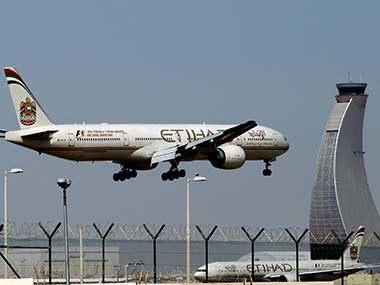Etihad Airways PJSC’s bid for a minority stake in Jet Airways India is non-binding and subject to fulfillment of certain conditions by the temporarily grounded airline’s lenders, said
two people aware of the matter to Mint. Etihad seems to have learnt its lessons from its gushing enthusiasm in its foreign forays that ended up singeing it. In 2015, Etihad had to write off its investment in Italian carrier Alitalia, which filed for bankruptcy after posting a loss of more than $117 million. It took another hit in 2017 when Germany’s Air Berlin filed for insolvency, after Etihad said that it was no longer in a position to provide financial support to the airline which had run into losses of close to $1 billion over six years. In a way, therefore, Etihad has a Midas touch in reverse but then airline industry world over has been witnessing plummeting fortunes. [caption id=“attachment_3769223” align=“alignleft” width=“380”] Representational image. AP[/caption] Chastened by its bitter foreign experiences, Etihad seems to be careful with the revival of Jet Airways. Once bitten, twice shy. Etihad has been twice bitten and hence is being extra careful to the point of wanting to have the cake and eat it too. It has reportedly offered to take a minority stake in Jet Airways subject to the State Bank of India-led (SBI) consortium of banks pumping more loans and the Securities and Exchange Board of India (SEBI) exempting it from making public offer. Its is a non-binding offer. It wants to hedge its bets by roping in the India’s nascent sovereign wealth fund, National Investment and Infrastructure Fund (NIIF) launched in 2015, as the new joint promoter. NIIF, obviously, would play second fiddle to Etihad even while sinking in more money. Etihad Airways’ decision to bid for Jet Airways could possibly be a way to preserve the bilateral it was given, as well as to protect its India feed. Its decision to place a conditional and non-binding bid follows the ouster of Naresh Goyal from the board room as well as from major equity stake holder. It also seems to have won over the SBI-led banks’ resistance to close to 80 percent haircut. Etihad seems to have got all that it wanted as a precondition for a greater role as a strategic investor. Etihad finds Indian market too lucrative to give up especially the 60,000 seats it get under the bilateral which it fears may be withdrawn by the Indian government should its commitment towards Jet Airways is seen to be waning. But the Indian officialdom seems to have blinked first. While Etihad might not make loads of money from its Indian investments in Jet Airways in the foreseeable future, it is coveting the huge Indian passenger traffic to the US and Europe via the Middle East hubs. But what is in it for SBI-led banks and NIIF apart from a distant dream of Jet Airways turning the corner and paying back the loans. How did NIIF allow itself to be offered as a sacrificial lamb? It is registered as an Alternate Investment Fund (AIF) with the market regulator SEBI with three main objectives — infrastructure investments by joining strong operating and financial partners, investing in fund of funds and investing in
strategic assets. One wonders which of the three objectives is going to be fulfilled by investing in Jet Airways. Has the government been naïve in asking NIIF to don the robes of knight to rescue Jet Airways? Critics and detractors are bound to wonder too how come the government chose its sovereign wealth fund to bail out a private sector carrier when its own airline, Air India, is down in the dumps. After all, a public sector undertaking (PSU) has a more justifiable claim over government funds vis-à-vis a private sector rival. Bailing out a private sector rival with government funds in addition would make the charge of crony capitalism stick. (The writer is a senior columnist and tweets @smurlidharan)
Etihad Airways’ decision to bid for Jet Airways could possibly be a way to preserve the bilateral it was given, as well as to protect its India feed.
Advertisement
End of Article


)

)
)
)
)
)
)
)
)



